Nautical Words And Phrases Transposed Into Other Uses: Can You Fathom That?!
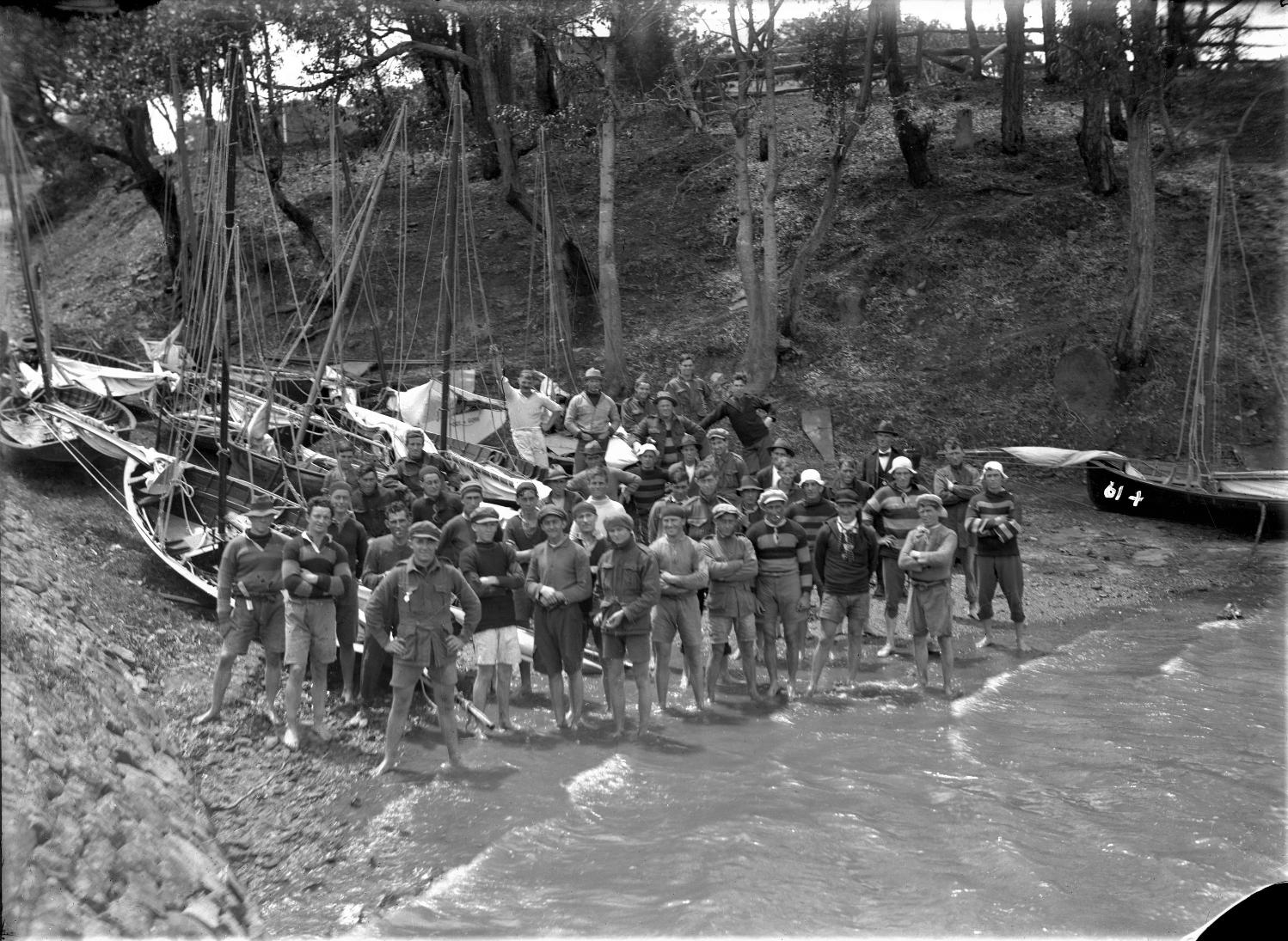
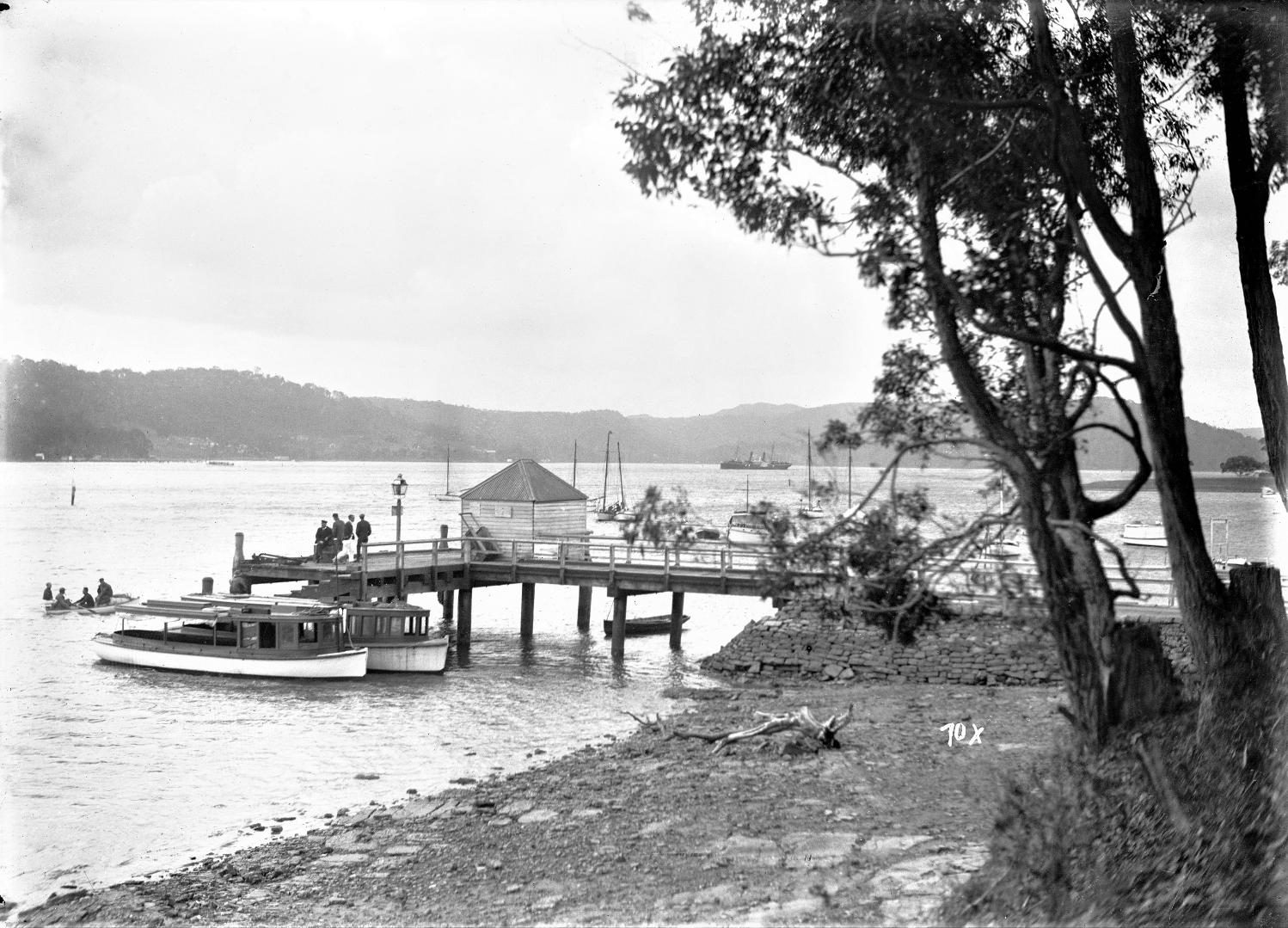
“Some years ago - never mind how long precisely - having little or no money in my purse, and nothing particular to interest me on shore, I thought I would sail about a little and see the watery part of the world. It is a way I have of driving off the spleen, and regulating the circulation. Whenever I find myself growing grim about the mouth; whenever it is a damp, drizzly November in my soul; whenever I find myself involuntarily pausing before coffin warehouses, and bringing up the rear of every funeral I meet; and especially whenever my hypos get such an upper hand of me, that it requires a strong moral principle to prevent me from deliberately stepping into the street, and methodically knocking people's hats off - then, I account it high time to get to sea as soon as I can. This is my substitute for pistol and ball. With a philosophical flourish Cato throws himself upon his sword; I quietly take to the ship.”
- Herman Melville, Moby Dick
Years ago the wonderful Norm Field of Avalon Sailing Club applied himself to attempting to teach a few sailing terms and the great sport of sailing itself to your hapless reporter. It was a great day and brilliant fun, inspiring an exploration of nautical terms themselves that has continued to the present day.
For those who have a passion for words, and even where those words stem from historically, along with applying some etymology, nautical terms are a boon that never ceases to surprise and delight.
These phrases, words and their application elsewhere has inspired songs, poetry stories and a way to say what you mean without being too rude about when something needs to be said. Similarly Sea Shanties, shanty, chantey, or chanty is a genre of traditional folk song that was once commonly sung as a work song to accompany rhythmical labour aboard large merchant sailing vessels. They were found mostly on British and other European ships, and some had roots in lore and legend.
But let’s begin with a single word that is apt - did you know the nautical term ‘fathom’, which once meant to me I may ‘understand’ something, and is a unit of length equal to six feet (1.8 metres), chiefly used in reference to the depth of water, stems from the longest of many units derived from an anatomical measurement, the fathom originated as the distance from the middle fingertip of one hand to the middle fingertip of the other hand of a large man holding his arms fully extended. The name comes from the Old English faedm or faethm, meaning outstretched arms. The name derives from the Old English word fæðm, cognate to the Danish (via the Vikings) word "favn" meaning embracing arms or a pair of outstretched arms. Cognate maybe also via the Old High German word "fadum" of the same meaning. In Middle English it was fathme.
Conversely, a burial at sea, (where the body is weighted to force it to the bottom) requires a minimum of six fathoms of water, is the origin of the phrase "to deep six" as meaning to discard, or dispose of.
The phrase is echoed in Shakespeare's The Tempest, where Ariel tells Ferdinand, "Full fathom five thy father lies".
Pretty cool stuff.
Of course, I’m not the only one who has had to resort to a nautical dictionary when out on the briny to fathom what is actually being said as these instructions fly fast around by poor dim head, as this example from 1884 amply illustrates; -
NAUTICAL TERMS.
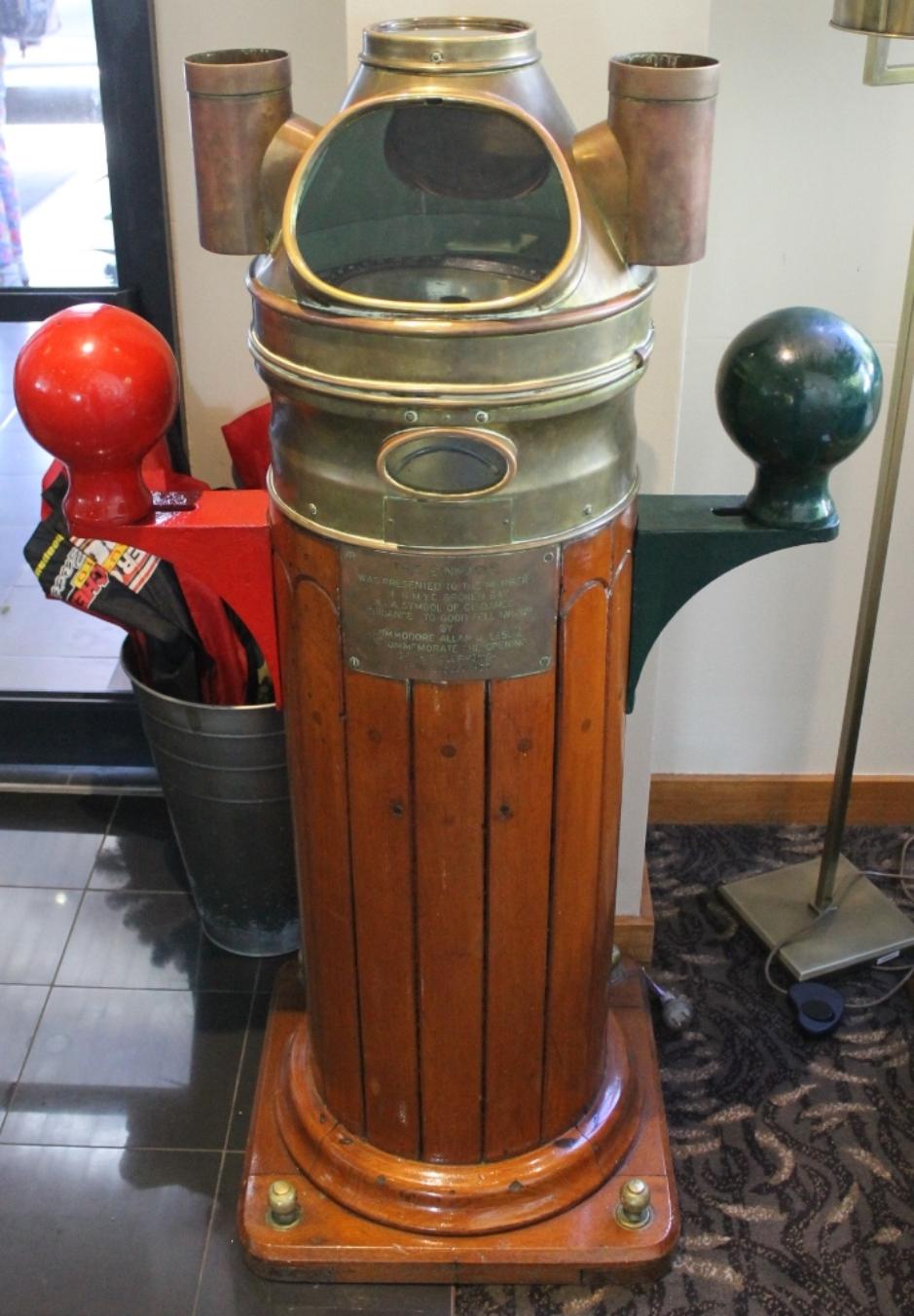 ' How are you getting along -with - your new yacht ?' said an old settler to another old settler who is having steam yacht built in the country for use on one of the lakes. ' When do you launch her ?'
' How are you getting along -with - your new yacht ?' said an old settler to another old settler who is having steam yacht built in the country for use on one of the lakes. ' When do you launch her ?'
' O, they are getting along all right I guess,' said the yacht owner, ' but I don't know what you mean by ' lunching' her. I didn't know as any lunch went with a yacht.' ' Who said lunch ?' remarked the first old party, who knew something about a sea-faring life. ' I said launch, that is, to get her into the water.'
' O, you mean when we going to slide her in?’ ‘ Yes, yes. But I had no thought about that. I supposed they would put castors under the roof on the bottom, and roll her around on land. Say, Jim,' said the yacht owner, calling his friend one side, 'In strict confidence I want to tell you I don't know any more about yachting than I do about religion. The fact is, the boys told me I ought to have a yacht; and so I ordered one, but I have nearly driven the gentlemen crazy that is building it for me, by my landsman remarks. I try to pretend that I know all about the different things he speaks of but its all Greek to me. "What's a rudder, anyway ? He wrote to me the other day to send him a rudder shoe, and I sent-a pair of them by express, and do you know, he kicked terribly when he opened the package, and found a pair of rubber overshoes. How did I know what a rudder shoe was ? He sent out for a windlass, and I found where some fellows had been digging a well, and bought the windlass they had been rising for a dollar and a half, and sent it out, and it came back on the next train with indignant remarks about my intelligence. He sent for a binnacle, and I never was so stuck in my life. I thought maybe a binnacle might be something that went with the rudder shoe, and I went to the stocking counter in a dry goods store, and asked the girl in charge, if she would let me have a look at some of their binnacles. She was a real spry looking girl, and did not look as though she would deceive an old man, but I could see she was surprised. She asked me what size I wanted, and I told her I should think about number eight or nine. Then she told me I would have to go to the corset counter, and I went there and asked the girl how she was off for binnacles, and she said she was not off for binnacles, as she knew of, and then the stocking counter girl came up and whispered to her, and she asked me if I wanted a binnacle for myself or my wife; Do yon know, the cold perspiration raised right np on my forehead, but I told her I wanted, a binnacle that would do for either myself or any of the family, a sort of combination binnacle as it were. O, you don't catch the old man on any cross examination! The girls held a consultation and called a floor-walker, and talked with him, and then one of them asked me if I wanted a binnacle that laced up on one side, or hooked in front; and I told her I didn't want either, I wanted one that buttoned up. They said then I better go to the glove counter, and I went there, and when I said I wanted a binnacle, the girl asked me what color, and I told her I wanted a terra cotta binnacle." She said the nearest she had was lavender, "and that she couldn't sell me a single one. She said I would have to take a pair. I didn't want a pair, and she asked me if I was' buying a what do you call it, for a one armed man, that If so, which hand, right or left. I was stuck, then, and asked her, with some indignation, if she knew what a binnacle was, anyway, and she said she would be blessed if she did. I like frankness, but I was really in hopes she did know what a binnacle was, but just then the floor-walker came up with three other girls,' and he asked me what a binnacle was for, and I told him it was for use on a yacht ' Then he said that was – all right, and I could find it at the underwear counter, so I went there and told the girl, a real intelligent person, that I wanted a binnacle for a yacht, and one of the girls said, ‘he wants a combination binnacle that he or any of his family can wear,' and the other girl said 'one that buttons up,' and the girl above the glove counter said, 'give him a terra cotta coloured one.'
‘Well, I pledge you my word the binnacle business was becoming serious. The underwear girl opened several boxes, and said she didn't believe they had terra cotta, but they had brown, and lisle thread, and silk. I told her to give me a silk one as quick as she could, and if she didn't pull out a silk undershirt, a female one, I hope to die, and I took it. I was glad to get out of the store, because all the girls were laughing at me I suppose I sweat a pailfull. But that was nothing to what I suffered when I took the binnacle up to where they are building the boat.
The captain asked me about the binnacle, and I told him it was in the small package, and he opened it. I knew when he was opening it that he had doubts as to whether I knew what a binnacle was, and when he pulled out that female undershirt out and held it up by one arm, I shall never forget the look on his face. Well, an old sailor shouldn't expect too much of a man who has never been to sea any more than to join the Baptist church. I gave the binnacle to a hired girl at the hotel, and squared myself with the captain by saying that I ordered a binnacle and they had probably sent that thing by mistake, and had sent the binnacle to some lady that had ordered the shirt. The captain said he would like to see the lady when she tried to put the binnacle on. I have found out that a binnacle is a thing that they put a compass in, for use in the pilot house; but I don't see why they don't call it something that a man can understand.
I came near getting my neck broke when I was up there. Everything is called by some other name about a ship. A rope is called a ' painter.' The captain throwed a rope over the side, and told me to fasten it to the end of the painter on the ground Well, there was a Dutch fellow painting the side of the yacht, and I made a slip noose and fastened it to the slack of the painter's pants. He didn't understand our language, and I thought it was done for a purpose, and just then the captain asked me if I had made it fast, and I said, 'aye, aye, sor,' and he shouted to one of the men to ' hoist away,' and I am blessed if they didn't jerk that painter right over the side, by the seat of the pants, and half way up the mast, and he yelled murder in a foreign language, and spilling a bucket of paint on deck. They let him down, and then the captain explained that a painter was a small rope. The painter was mad, and chased me all over the shipyard with an axe. I had to buy him a new pair of pants, but I don't care for t expense, as I am learning something every day. Say, what is the tiller rope? '
‘Oh, I don't know, said the first old citizen, ' you better go up to the dry goods store and ask the girl at the corset counter,' and they separated, the yacht owner to go and consult the encyclopedia, and the old man to take a drink…— Pecks Sun NAUTICAL TERMS. (1884, July 26). Hamilton Spectator (Vic. : 1870 - 1918), p. 1 (SUPPLEMENT TO THE HAMILTON SPECTATOR). Retrieved from http://nla.gov.au/nla.news-article226051509
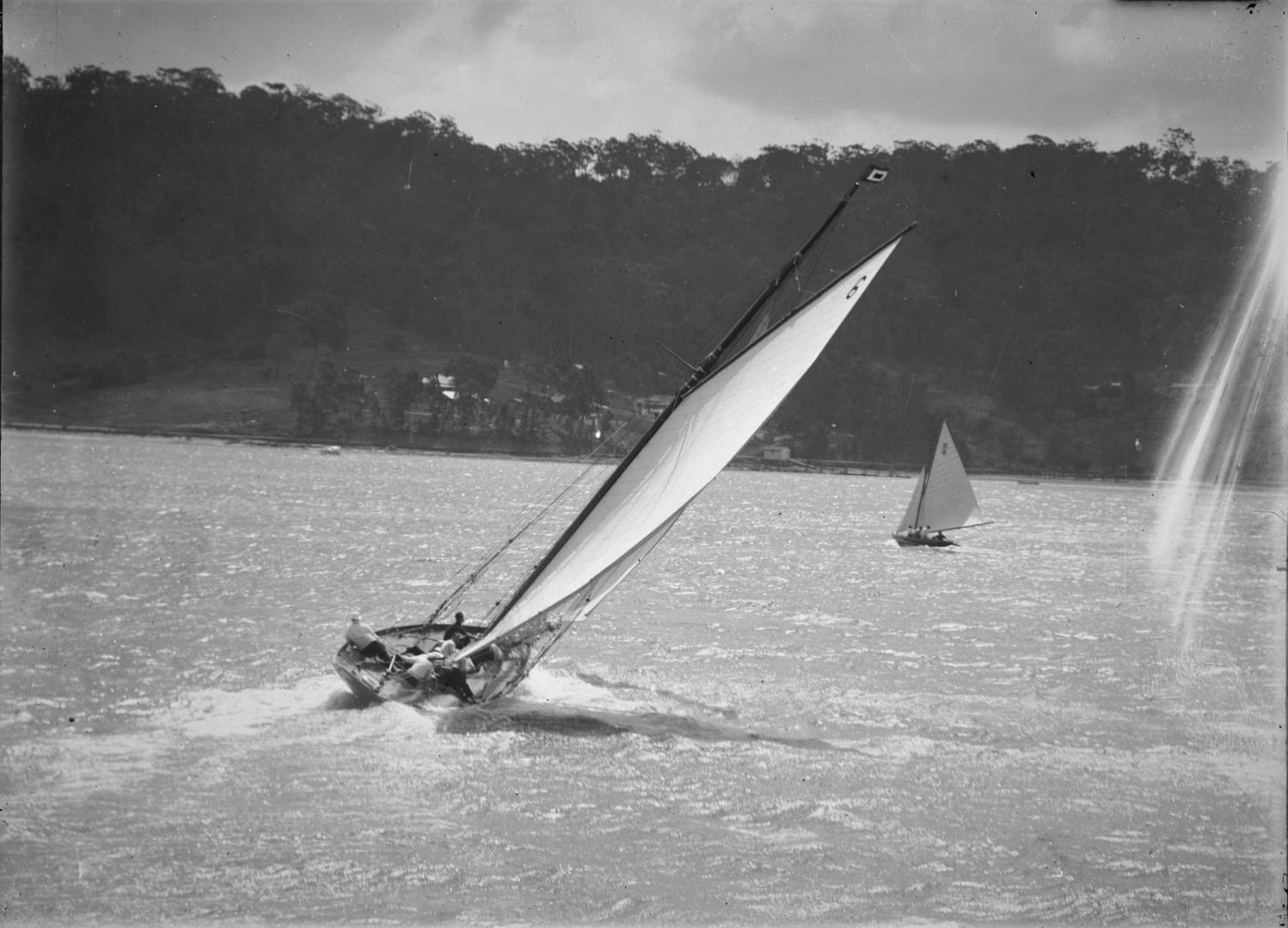
RAWHITI sailing at the 1921 Pittwater Regatta - image taken on December 26th, 1921. This image appears in The Sydney Mail, 4 January 1922, page 18. The yacht in the background is most likely to be CORELLA. ANMM photo.
What remains fascinating is the reuse of these words and phrases in other ways as we and our language evolves.
For example when your boat is ‘in irons’ it refers back to people being ‘shackled’, since prisoners ‘in irons’ were unable to move – just like a boat caught with its sail up that has lost wind power.
There are many other phrases used every day that originate from the nautical world.
Some examples:
Chock-a-block - When something is ‘very full’ it’s chock-a-block. This is thought to originate from ‘chock-full’ (choke-full), which means ‘full to choking’. Later, the term was used to identify wood wedges used to stop objects moving around. ‘Chocks’ were often found on ships, and are referenced as far back as 1769 by William Falconer in An universal dictionary of the marine, which defines it as a, ‘sort of wedge used to confine a cask or other weighty body… when the ship is in motion.’ The Block component, according to Meriam Webster Dictionary, a ‘block and tackle’ is a type of pulley used on ships to hoist up sails. When the sail was pulled all the way up, with no leeway in the rope and the blocks jammed tight, they were considered ‘chock a block’. That’s why we say something is ‘chock a block’, when it can’t go any further or is really full.
Groggy, today, means feeling weary, perhaps a little bleary after a long hard night - right? We also align it with having had too much alcohol (AKA grog) in that you get groggy. Grog is meant to be a simple alcoholic drink containing water and spirits. However, an Admiral Edward Vernon (1684 to 1757) had a penchant for wearing grogram jackets, made from a coarsely woven material called ‘grogram’ (originally, ‘gros-grain’). Admiral Vernon also had a penchant for watering down his crew’s rum to stop them from getting too drunk at sea. Hence the term, ‘groggy’. The word itself was first used in print in The Gentleman’s Magazine in 1770. The piece, titled, 80 names for having drunk too much said: Groggy; this is a West-Indian Phrase; rum and water, without sugar, being called grogg.
That, naturally, brings in recollection of the phrase ‘the sun is over the yardarm’ which was a Naval officers’ expression meaning "It is time for a drink", as it is bad form to have a drink on board before sun is over the yardarm, i.e. approaching noon, or in aquatic-speak and more correctly ‘Foreyard that Yardarm’.
And all that may lead to being ‘cranky’, from the Dutch krengd, a crank was an unstable sailing vessel. It has come to mean irritable.
Another phrase still in use, Devil to pay, Devil and the deep blue sea, also have aquatic origins. In traditional wooden ships, the sailors had to caulk or pay the seams with hot tar between the planks of the deck to prevent leakage into the bilge. The devil seam was topmost on the hull next to the scuppers at the edge of the deck and the longest and most difficult seam to caulk. Hence, if there was the "devil to pay," then this was the most difficult and dangerous job since the sailor might be knocked down by a large wave and find himself between the "devil and the deep blue sea." Today, the expression "devil to pay" is used to mean that there will be a big price to pay, and "devil and the deep blue sea" refers to being in a difficult or unpleasant position like being "between a rock and a hard place."
The cut of your jib – liking the ‘cut of one’s jib’ refers to liking another person’s manner, style or personality is another phrase with nautical origins. As you know, the jib is the triangular sail typically used at the front of a sail boat. In the past, different countries had different styles of sails, so the origin of a ship could be worked out by the kind of jib it had. As a result, sailors could identify and proffer their opinions on the nationality of a sail boat, based on its jib. The idiom was made popular in the 19th Century by Sir Walter Scott, who used it in the 1824 novel St Ronan’s Well. Sir Scott wrote: If she disliked what the sailor calls the cut of their jib.
All fair and above board is another now commonly used expression of nautical origin meaning "utterly fair nothing hidden". Things "above board" were on or above the upper deck and so open for all to see.
Adrift, another word that stems from the nautical world, is now applied to people and things - they cast that policy adrift. Brings to mind 'all at sea' doesn't it?
The word ‘webs’ is Sailor’s slang name for his feet. A now defunct from our language phrase ‘to have a weed on’ was Sailor’s slang for having a grievance and expanding on it to the point where you’re now annoying others too.
Avast! means ‘Hold! Enough! Finish!’ It comes from the Italian word "Basta".
Here’s one our local Builders may recognise – backing and filling, which had nothing to do with excavating in this instance. This was a common expression, of maritime origin, for constantly changing ground in a decision or argument.
The ‘dead reckoning’ stems from aquatics as well, not a zombie movie. Originally, the practice of keeping a log based on estimated speed was called 'deduced' reckoning. Over time, this turned into dead reckoning. Dead reckoning is the process by which the position of the ship at any moment is found (without any observation of the sun or stars) based upon the last well-determined position and the run that has been made since that last position. For this purpose, the ship's course indicated by its compass, the distance indicated by the log, and drift and leeway were all taken into account.
Aloof is a nautical order to keep the ship's head to the wind, thus to stay clear of a lee shore or some other quarter. The front part of the sail which meets the wind is called the luff. A sailing vessel that could point higher to windward and hold its speed better than another was said to stand apart or to sail a-luff that later became aloof. Today the word is used to describe a person who is distant or stands apart from the others.
The verb to ‘bale’ out, meaning to remove water, comes from the old name "boyle" for a bucket.
Similarly, ‘bear up’ is a sailing expression, meaning to bear the tiller up to windward in order to keep the vessel’s head away from the wind. Today it remains in common use, with the metaphorical meaning of "Keep your spirits up!"
At a rate of knots is now used by many and stems from being on the water, meaning there to go at top speed. This is used to describe someone who is traveling or driving very fast.
A ‘Clean Bill of Health’ is a now widely used term which originates from the "Bill of Health", a document issued to a ship showing that the port it sailed from suffered from no epidemic or infection at the time of departure.
Port and starboard still confuse some …. ‘Left, no left... LEFT! Ok; the other right!’ remains an instruction mum, a sailor from her earliest years, still gives me… In the earliest ships there was no rudder and the ship was steered by a "Steerboard" (large car or sweep) sited over the right-hand side of the stern; hence that side of the ship came to be known as the Starboard side. The other side of the ship was in consequence used for going alongside for embarking or disembarking cargo through the ‘load-ports’; the left hand side of the ship therefore became known as the "Loadboard" side, the "Larboard". As the use of this latter word inevitably caused confusion with the word Starboard, the word Port came to be used instead. By some authorities, the Venetians are given the credit for the origin of "the word" - ‘board’ comes from the Italian ‘Borda’ meaning side; the side with the steering oar was ‘Questa borda’: the other side was ‘Quella boarda’; these two expressions would rapidly become adapted into Starboard and Larboard.
Simplest for us simpletons is A1, the accepted synonym for first-class has a nautical bent. In Lloyd’s Register, A1 is the mark of a wooden ship of the first class, A referring to the quality of her hull and "1" to the quality of her equipment. Generations on Frank Sinatra would use this as a way to sing about being in New York New York ... - ok; that may be wrong.
Locally we have the Palm Beach Sailing Club which names one of its annual Regattas after a nautical word. The name for the regatta 'Beware The Bullets' stems from the sailing course area near Barrenjoey Headland. The sand spit connecting it to the mainland allows the traditional nor-east sea breeze to blow over the sand spit, but also bend around the headland. At times there are freak gusts that bounce down onto the water in short bursts that can catch the sailors by surprise. These unexpected gusts are called 'Bullets'. When sailing close to Barrenjoey Headland you therefore need to be careful or 'beware of the bullets'.
These are just a few examples of our long love of being nautical intermingling with how we express that in other spheres and the value with which it has enriched our language thereby. The places those sourced here were found are listed under references should you wish to explore further when next lost for words or would like to wish someone fair winds and following seas.
Of course, it’s good to know you’re not the only nautically linguistic ignoramus among so many adepts – but as we here in Pittwater, although still churning out world sailing champions, don’t take ourselves too seriously, a note of levity from a fellow ‘expert’ closes this insight into being Matelot Mad - Now that will put a smile on your dial!
HISTORY MADE AGAIN AT PITTWATER
(BY GUM)
ADMIRAL CHEWN GUM, my illustrious ancestor, is quoted as having said,
'He who cannot sail a boat, will sink unless he keeps afloat.'
Yachting and boating and sailing and rowing are things which have been in our family for years.
At the age of sixteen I knew how to handle an oar.
At eighteen, I was an apprentice to a bow-sprit manufacturer.
At nineteen, I was foreman of a spinnaker works, and at 21 I could tack down carpets.
The salt water is in my blood. You ask the barman!
Nothing suits me better than to see the keel filling bravely before a following wind. The surge of the mainsail as it cleaves the briny deep is music to me.
You should have seen me taking my turn at the wheel during the Pittwater Regatta! I was captain of the sixteen-footer, Noogooloowoo.
Pacing up and down the bridge, I snapped my orders out into the teeth of the gale.
'Avast! Belay a bit on the port; that's all the port we've got. All hands make fast! Reef in the starboard helm and buckle it down. All hands to the pumps. Women and children first. Yes, I don't mind if I do. Not too much soda. Throw in your clutch!'
And other nautical terms.
* * *
The crew responded immediately. 'Ring-bark the main-mast!' I cried; 'we're getting too far in front!'
Rounding the buoy, the chief steward leaned over and hauled it aboard. We were the only boat to round the buoy.
The waves lashed themselves into fury, the sky was, overcast, dark, and lowering, the lightning crashed and struck four of the crew stone dead on the promenade deck. The seas were mountains high.
'Everybody get off the boat!' I cried. 'Throw over the bulwarks! Smash in the stern!!
Somehow, the boat had to be lightened.
I could hear the timbers groaning and creaking as I went below, to save the papers. I remember no more, until I heard a voice saying, 'Captain Gum, you have had a most signal success.'
'I see no signals,' I replied, putting the glass up to my blind eye.
I then fainted again.
DRESSING ROOM ECHOES (1931, December 30). Referee (Sydney, NSW : 1886 - 1939), p. 12. Retrieved from http://nla.gov.au/nla.news-article136750458
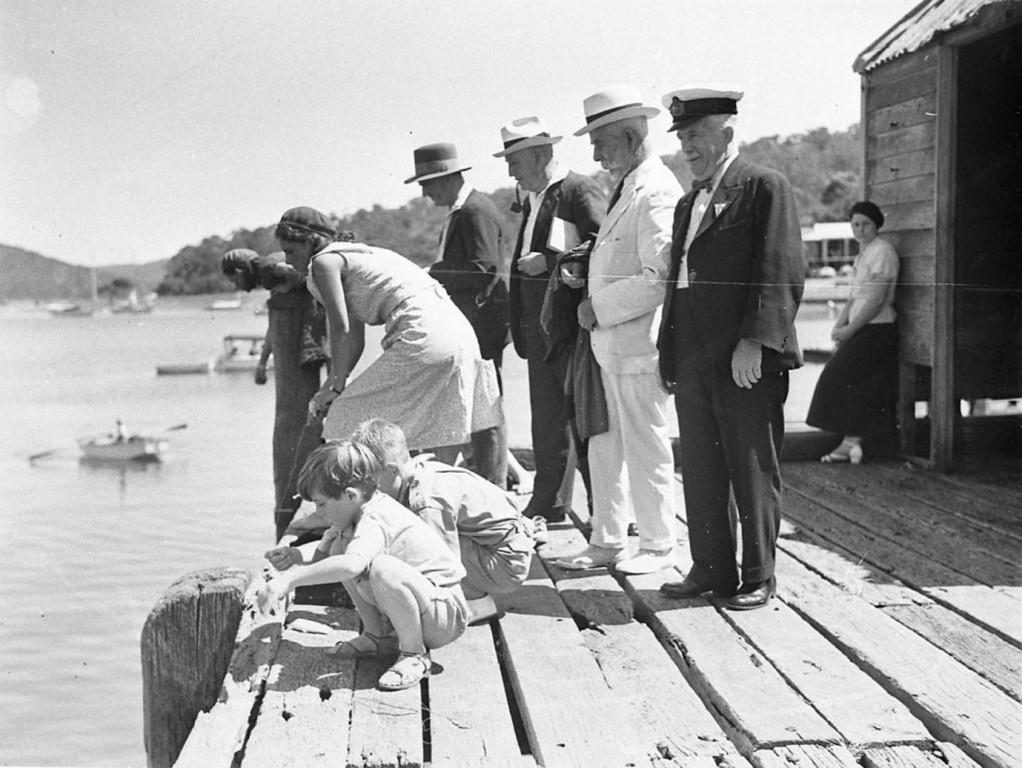
Top: 'Fishing from a jetty at Taylor's Point' - taken by Sam Hood during Pittwater Regatta, Broken Bay - possibly officials ensuring Taylors Point mark for races is rounded. Image No.: hood_06542, circa 1930's, courtesy State Library of NSW
References
- TROVE – National Library of Australia
- Jack Speak, a Matelots Dictionary, at: http://www.gunplot.net/traditions/Navalterminology.html
- Nautical language at: https://www.see-the-sea.org/nautical/naut-body.htm
- Wikipedia contributors. (2021, July 1). Glossary of nautical terms. In Wikipedia, The Free Encyclopedia. Retrieved from https://en.wikipedia.org/w/index.php?title=Glossary_of_nautical_terms&oldid=1031469134
- Avalon Sailing Club Teaches A Novice To Sail
- Pittwater Regattas Dates and Flagships Part I – Steamers And Ferries Of Pittwater
- Binnacle in Royal Motor Yacht Club – Broken Bay foyer - presented by Commodore Allan G Leslie
- Ships Biscuits - The At Sea Necessity That Floated William Arnott’s Success
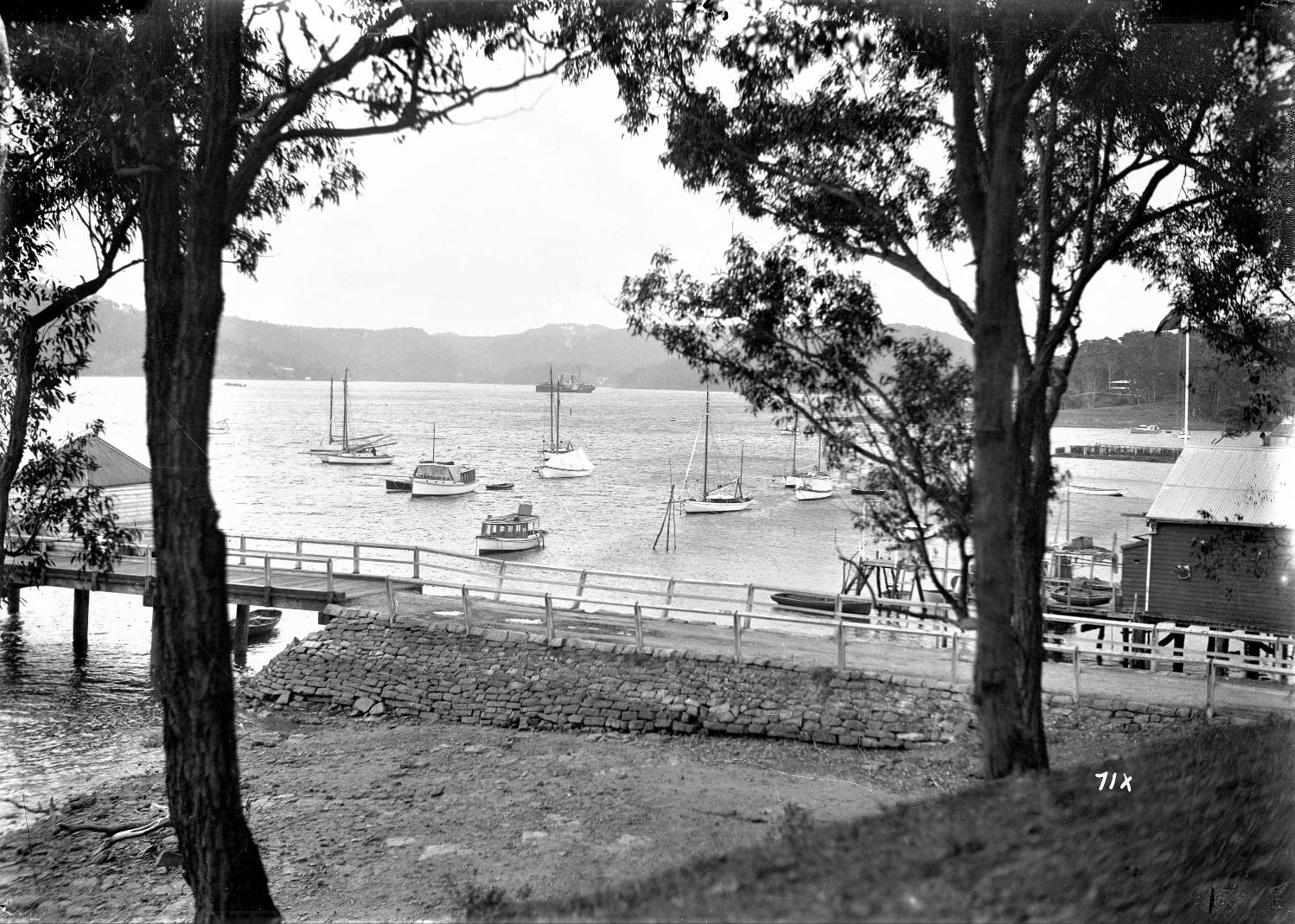
Haul Away Joe
Lyrics: original
When I was just a little lad or so me mammy told me,
(Away haul away, we'll haul away Joe.)
That if I didn't kiss the girls me lips would grow a-moldy.
(Away haul away, we'll haul away Joe.)
Away (Ho!) haul away! we'll haul away together!
Away haul away, we'll haul away Joe.
Away (Ho!) haul away! we'll haul for better weather.
Away haul away, we'll haul away Joe.
I used to have an Irish girl, but she got fat and lazy
(Away haul away, we'll haul away Joe.)
But now I've got a Bristol girl, and she just drives me crazy
(Away haul away, we'll haul away Joe.)
Away (Ho!) haul away! we'll haul away together!
Away haul away, we'll haul away Joe.
Away (Ho!) haul away! we'll haul for better weather.
Away haul away, we'll haul away Joe.
Old Louis was the king of France before the revolut-i-on.
(Away haul away, we'll haul away Joe.)
But then he got his head chopped off it spoiled his constitut-i-on.
(Away haul away, we'll haul away Joe.)
Away (Ho!) haul away! we'll haul away together!
Away haul away, we'll haul away Joe.
Away (Ho!) haul away! we'll haul for better weather.
Away haul away, we'll haul away Joe.
You call yourself a second mate, you cannae tie a bowline,
(Away haul away, we'll haul away Joe.)
You can't even stand up straight, when the packet she's a rollin'
(Away haul away, we'll haul away Joe.)
Away (Ho!) haul away! we'll haul away together!
Away haul away, we'll haul away Joe.
Away (Ho!) haul away! we'll haul for better weather.
Away haul away, we'll haul away Joe.
Well now can't you see the black clouds a-gatherin'.
(Away haul away, we'll haul away Joe.)
Well now can't you see the storm clouds a-risin'.
(Away haul away, we'll haul away Joe.)
Away (Ho!) haul away! we'll haul away together!
Away haul away, we'll haul away Joe.
Away (Ho!) haul away! we'll haul for better weather.
Away haul away, we'll haul away Joe.
Noël Coward: Matelot
National Youth Choir of Australia - published October 2017
Lyrics
Jean Louis Dominic Pierre Bouchon,
True to the breed that that bore him,
Answered the call that held in thrall
His father's heart before him.
Jean Louis Dominic sailed away
Further than love could find him
Yet through the night he heard a light
And gentle voice behind him say:
Matelot, Matelot,
Where you go my thoughts go with you
Matelot, Matelot,
When you go down to the sea
As you gaze from afar on the evening star
Wherever you may roam
You will remember the light through the winter night
That guides you safely home.
Though you find womenkind to be frail,
One love cannot fail, my son,
'Til our days are done....
Matelot, Matelot,
Where you go my thoughts go with you
Matelot, Matelot,
When you go down to the sea.
Jean Louis Dominic Pierre Bouchon
Journeyed the wide world over
Lips that he kissed could not resist
This loving roving rover.
Jean Louis Dominic, right or wrong,
Ever pursued a new love
Till in his brain, there beat a strain
He knew to be his true love song:
Matelot, Matelot,
Where you go my heart goes with you
Matelot, Matelot,
When you go down to the sea
For a year and a day you may sail away
And have no thought of me,
Yet through the wind and the spray you will hear me say
No love was ever free.
You will sigh when horizons are clear,
Something that is dear to me
Cannot let me be,
Matelot, Matelot,
Where you go my heart goes with you
Matelot, Matelot
When you go down to the sea.
Matelot, Matelot,
Where you go my heart will follow
Matelot, Matelot,
When you go down to the sea
When there's grief in the sky and the waves ride high
My heart to yours will say
You may be sure that I'm true to my love for you
Though half the world away.
Never mind if you find other charms,
Here within my arms you'll sleep,
Sailor from the deep....
Matelot, Matelot,
Where you go my heart will follow
Matelot, Matelot,
When you go down to the sea